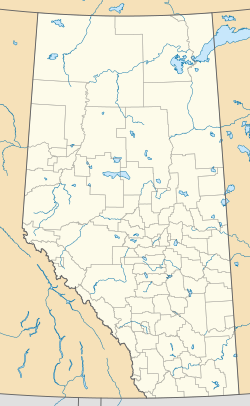Two Hills is a town in central Alberta, Canada. It is approximately 137 km (85 mi) east of Edmonton at the junction of Highway 45 and Highway 36. Two Hills is primarily an agriculture-based community. It was named from the presence of two hills located near the town. Post office established in 1914. [6]
Two Hills | |
|---|---|
Town | |
| Town of Two Hills | |
 | |
| Motto: Small Town With A Big Future | |
Location of Two Hills in Alberta | |
| Coordinates: 53°42′54″N 111°44′46″W / 53.71500°N 111.74611°W | |
| Country | Canada |
| Province | Alberta |
| Region | Central Alberta |
| Census division | 10 |
| Municipal district | County of Two Hills No. 21 |
| Incorporated[1] | |
| • Village | June 4, 1929 |
| • Town | January 1, 1955 |
| Government | |
| • Mayor | Leonard L. Ewanishan |
| • Governing body | Two Hills Town Council |
| Area (2021)[3] | |
| • Land | 3.11 km2 (1.20 sq mi) |
| Elevation | 603 m (1,978 ft) |
| Population | |
• Total | 1,416 |
| • Density | 454.7/km2 (1,178/sq mi) |
| Time zone | UTC−7 (MST) |
| • Summer (DST) | UTC−6 (MDT) |
| Postal code span | |
| Area code | +1-780 |
| Highways | Highway 36 Highway 45 |
| Waterway | Vermilion River |
| Website | Official website |
Demographics
editIn the 2021 Census of Population conducted by Statistics Canada, the Town of Two Hills had a population of 1,416 living in 445 of its 527 total private dwellings, a change of 4.7% from its 2016 population of 1,352. With a land area of 3.11 km2 (1.20 sq mi), it had a population density of 455.3/km2 (1,179.2/sq mi) in 2021.[3]
The population of the Town of Two Hills according to its 2017 municipal census is 1,443,[7] a change of 0.8% from its 2012 municipal census population of 1,431.[8]
In the 2016 Census of Population conducted by Statistics Canada, the Town of Two Hills recorded a population of 1,352 living in 399 of its 478 total private dwellings, a -2% change from its 2011 population of 1,379. With a land area of 3.38 km2 (1.31 sq mi), it had a population density of 400.0/km2 (1,036.0/sq mi) in 2016.[9]
Notable people
edit- Jackie Armstrong-Homeniuk MLA to the electoral district of Fort Saskatchewan-Vegreville in the 30th Alberta Legislature.
See also
editReferences
edit- ^ "Location and History Profile: Town of Two Hills" (PDF). Alberta Municipal Affairs. October 7, 2016. p. 674. Retrieved October 16, 2016.
- ^ "Municipal Officials Search". Alberta Municipal Affairs. May 9, 2019. Retrieved October 1, 2021.
- ^ a b c "Population and dwelling counts: Canada, provinces and territories, and census subdivisions (municipalities)". Statistics Canada. February 9, 2022. Retrieved February 9, 2022.
- ^ "Alberta Private Sewage Systems 2009 Standard of Practice Handbook: Appendix A.3 Alberta Design Data (A.3.A. Alberta Climate Design Data by Town)" (PDF) (PDF). Safety Codes Council. January 2012. pp. 212–215 (PDF pages 226–229). Retrieved October 9, 2013.
- ^ "Population and dwelling counts: Canada and population centres". Statistics Canada. February 9, 2022. Retrieved February 13, 2022.
- ^ Hamilton, William (1978). The Macmillan Book of Canadian Place Names. Toronto: Macmillan. p. 33. ISBN 0-7715-9754-1.
- ^ 2017 Municipal Affairs Population List (PDF). Alberta Municipal Affairs. ISBN 978-1-4601-3652-2. Retrieved January 13, 2018.
- ^ 2016 Municipal Affairs Population List (PDF). Alberta Municipal Affairs. ISBN 978-1-4601-3127-5. Retrieved January 13, 2018.
- ^ "Population and dwelling counts, for Canada, provinces and territories, and census subdivisions (municipalities), 2016 and 2011 censuses – 100% data (Alberta)". Statistics Canada. February 8, 2017. Retrieved February 8, 2017.
